The "lose-lose dilemma" of shared bikes
![]() 08/09 2024
08/09 2024
![]() 542
542
Shared bikes make the last mile 60% more expensive for commuters?
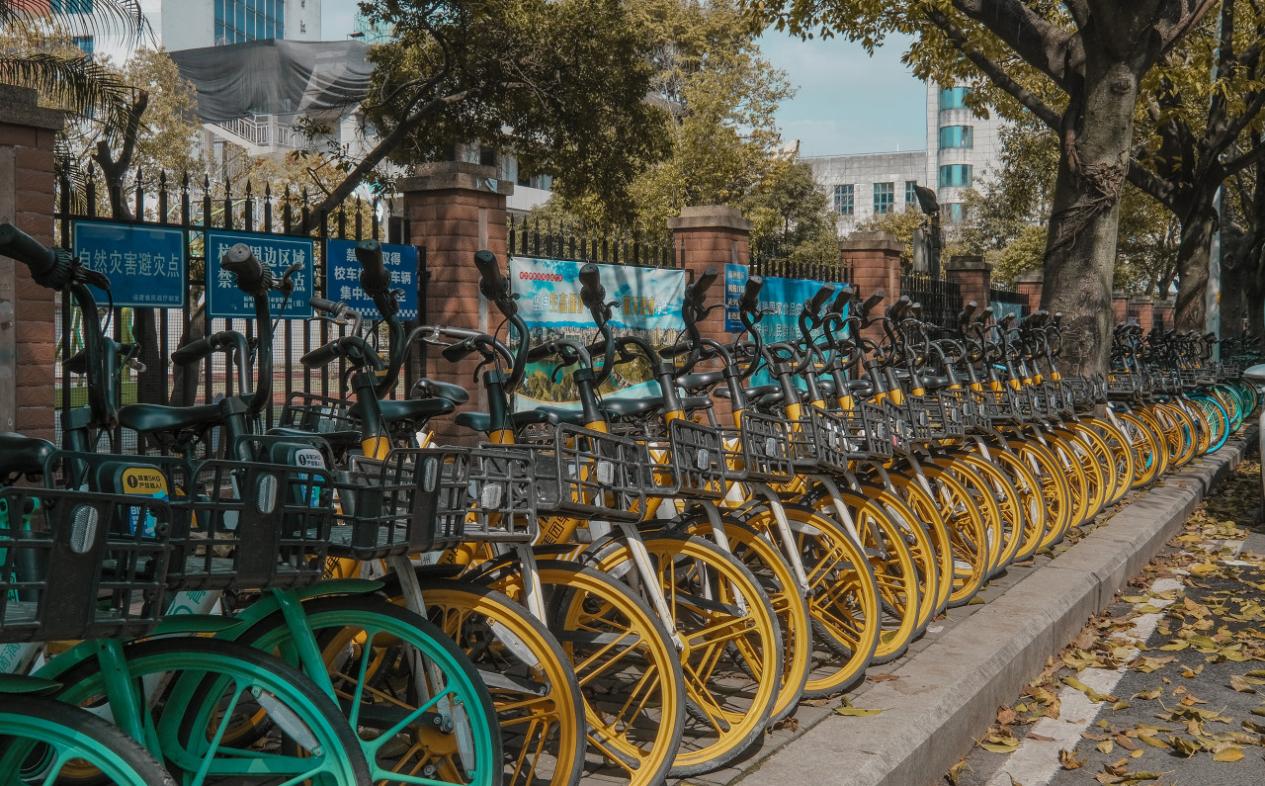
Working-class people are once again hit hard by minor price hikes in daily life.
Recently, according to The Paper, bike-sharing brands such as Hello Bike and DiDi Qingju have increased prices in cities like Chengdu, Guangzhou, and Wuhan. The fee standard has been adjusted from 1.5 yuan for the first 15 minutes to 1.5 yuan for the first 10 minutes on weekdays, and the starting fee on weekends and holidays has been adjusted from 1.8 yuan for the first 15 minutes to 1.8 yuan for the first 10 minutes, with an additional 1 yuan for the next 15 minutes.
This price increase has surprised many netizens who do not heavily rely on bike sharing for commuting and do not regularly pay attention to ride prices. "The price of 5.5 yuan per hour has already surpassed that of buses and subways," they say. "I remember when 2 yuan on a shared bike was enough to get me to my destination. Those days are gone."
And this is not the first time bike sharing prices have risen.
So, why has this latest price hike caused such a stir among the public and media? Are working-class people who struggle to make ends meet worse off than companies like Meituan, DiDi, and Hello Bike, which have been burning money for years to grab market share and are still not profitable? Is there a more mutually beneficial solution to the so-called "last mile" problem for both parties?
01
The bike-sharing giants of Meituan, Qingju, and Hello Bike dare only to test the waters with price hikes
Since the emergence of bike sharing in 2016, nearly a decade has passed, and its price has risen from the initial 0.5 yuan/30 minutes offered by ofo's "Yellow Bike" to the current 2.5 yuan (approx.) /30 minutes charged by the three dominant players: Meituan, Qingju, and Hello Bike, after nearly ten price increases.
So, why didn't the gradual price hikes over the past few years cause such a strong reaction from working-class people like this latest one? Simply put, previous hikes didn't hit their pain points.
If we calculate the price increase based on the hourly rate reported by various media outlets, the magnitude of this year's hike is actually much lower than that of five years ago when the three bike-sharing giants shortened the starting time from 30 minutes to 15 minutes. However, in reality, Hello Bike and Qingju's reduction of the starting time from 15 minutes to 10 minutes has dealt a significant blow to commuters exiting the subway but still needing to reach their workplace.
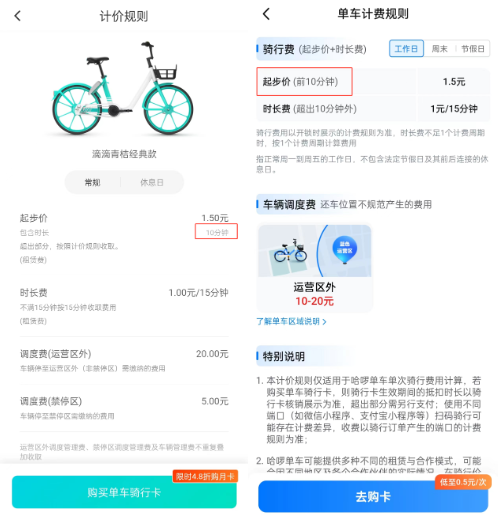
Image source: Qingju and Hello Bike apps
As a service designed to solve the "last mile" problem, the average usage time of shared bikes is generally short.
According to the "Shared Bike/Electric Bike Riding Report for Major Chinese Cities," the average single ride duration of shared bikes by active users in 2023 was 11.7 minutes. Among the six megacities, nine megaregions, five Type I large cities, and one Type II large city surveyed, only Harbin and Hefei had single ride durations outside the 10-15 minute range.
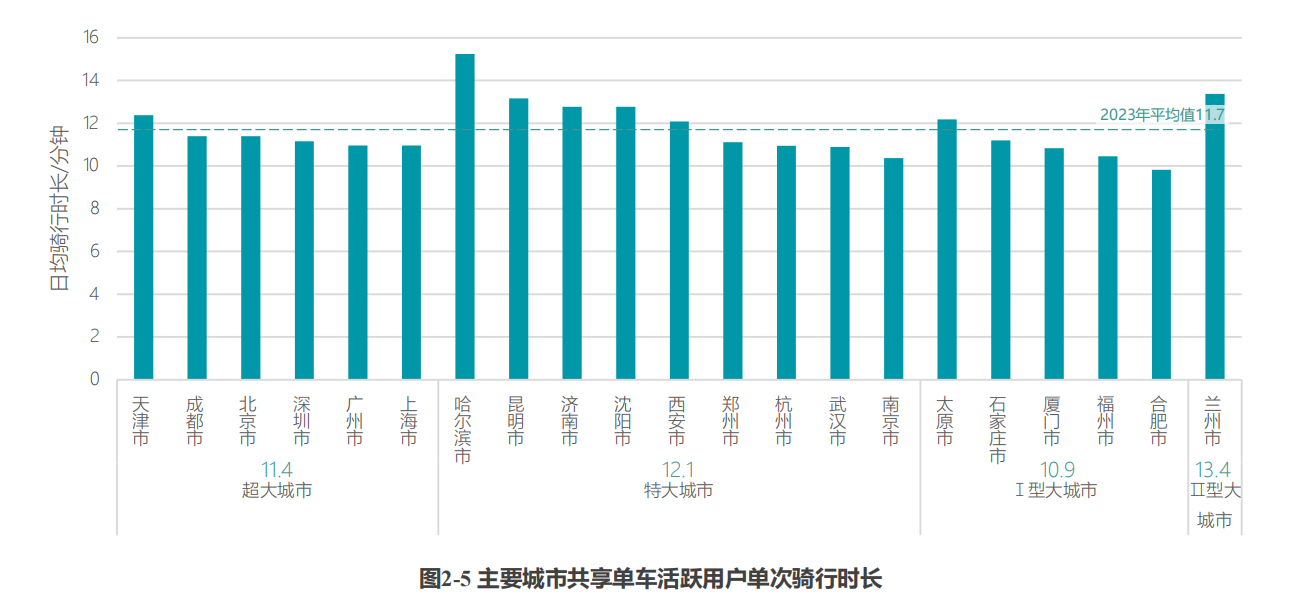
Image source: "2023 Shared Bike/Electric Bike Riding Report for Major Chinese Cities"
This price hike targets the "Achilles' heel" of commuters traveling from the subway station to their homes and offices.
This means that for over 90% of commuters, who previously only needed to pay the starting price of 1.5 yuan/1.8 yuan for the entire trip, they will now have to pay 60% more just for riding an additional two to three minutes. This is much higher than the 35% hourly price increase reported by the media. Coupled with the fact that rides just over 10 minutes do not reach the next pricing tier but still require full payment, this has naturally caused dissatisfaction among the public.
However, if one were to conclude that "capital naturally raises prices after low-price competition" based solely on this data, it would fail to consider the reality. After all, working-class people are the most frugal, and paying per ride instead of using monthly or quarterly passes would be illogical for them.
Taking the 30-day unlimited ride monthly pass as an example, the monthly subscription prices for Meituan, Qingju, and Hello Bike are 35 yuan, 25 yuan, and 35 yuan, respectively. With auto-renewal, the prices for Meituan and Qingju drop significantly to 18.8 yuan and 16.8 yuan, respectively. Coupled with regular "limited-time offers," these passes can typically be obtained for 15 to 20 yuan.
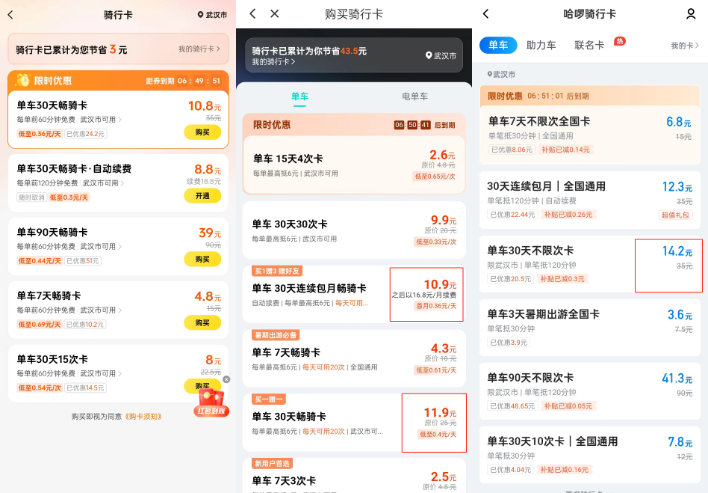
Image source: Meituan, DiDi, Hello Bike
At this rate, each working day would only cost 1 yuan. If that's still too much, cheaper prices can be found on secondhand platforms like Xianyu, combined with various payment discounts. With a little attention, it's not difficult to find deals that allow unlimited rides for 30 days for just over ten yuan, whether self-recharging or third-party recharging.

Image source: Xianyu
This behavior of claiming a price hike but not daring to actually raise prices reflects the "weakness" of the three bike-sharing giants. They want to test consumer tolerance without offending their primary source of income, fearing that the other two competitors might suddenly lower their prices and steal market share. The cautious approach of small, gradual price hikes during holidays, mainly due to considerations of price and marginal effects on active users, underscores this strategy.
02
Compared to working-class people, life is not easy for "capital" either
The seemingly contradictory and indecisive behavior of the three bike-sharing giants stems from their long-standing profitability issues.
The reason for their reluctance to raise prices is self-evident. With price sensitivity so high among their user base, even a minor increase can spark public outrage and give competitors an opportunity to seize market share.
However, it's understandable why the giants have long entertained the idea of raising prices. The most direct reason is that they operate in an unprofitable industry.
According to in-depth internet analysis and relevant data, the cost of manufacturing a shared bike ranges from 700 to 1,100 yuan. Assuming a four-year service life, the annual cost per bike is between 175 and 275 yuan.
In addition, the daily operation and maintenance cost per bike is about 0.5 to 1 yuan, totaling 182.5 to 365 yuan per year. Combined, the annual cost per shared bike ranges from 357.5 to 640 yuan.
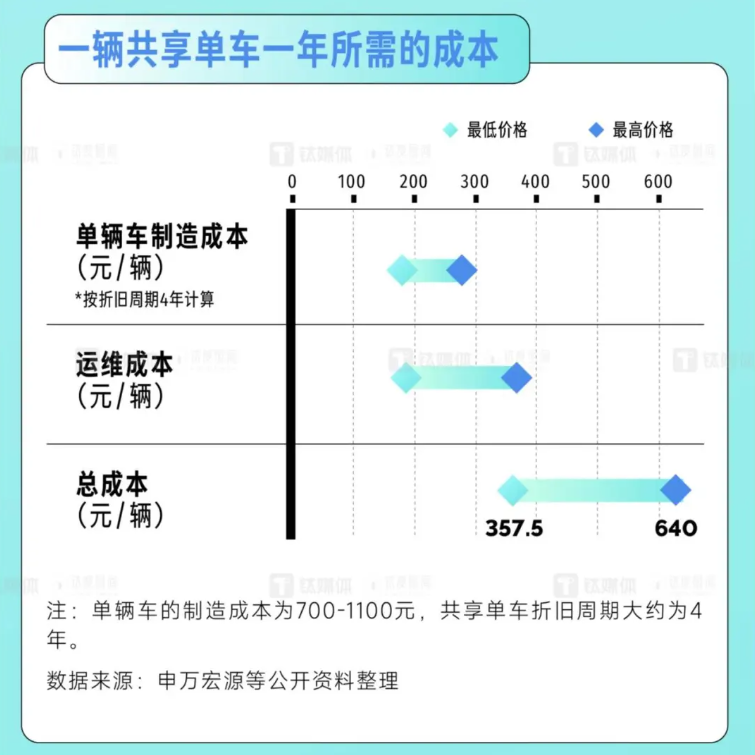
Image source: TMTPost
With most commuters opting for monthly passes, it's unrealistic for each shared bike to cover its 357.5 to 640 yuan in costs. The financial reports of the three giants reflect this reality.
Based on the latest deployment data for Hello Bike (10 million bikes), Meituan (5.2 million bikes), and Qingju (6 to 7 million bikes), their annual operation and maintenance costs are estimated at 3.58 to 6.4 billion yuan, 1.86 to 3.33 billion yuan, and 2.15 to 4.48 billion yuan, respectively.
Hello Bike has suffered the most, with reported losses of 2.208 billion yuan, 1.505 billion yuan, and 1.134 billion yuan in 2018, 2019, and 2020, respectively, when it planned its IPO in 2021.
Qingju and Meituan are not faring much better. According to financial reports, Meituan's new business segment, which includes bike sharing, narrowed its losses from 28.379 billion yuan in 2022 to 20.166 billion yuan in 2023. Qingju, after struggling for three years, still reported a net loss of over 5 billion yuan in its bike-sharing business in 2023.
Faced with this difficult situation, the three giants have also explored the electric two-wheeler market.
However, consumer demand remains focused on solving the "last mile" problem, making electric two-wheelers, which are more expensive and costlier to maintain than shared bikes, less appealing. Hello Bike, the first to enter this market, has focused on selling and leasing electric bikes but has not expanded significantly. Meituan and Qingju have also not expanded widely, likely due to limited coverage and low return on investment.
In summary, the three bike-sharing giants are caught in a dilemma. Raising prices may lead to user loss and further compress already slim profit margins, while not raising prices will continue to bleed the companies.
Therefore, Hello Bike, Meituan, and Qingju have been gradually raising prices to test user loyalty and price sensitivity. However, none of the three seems to have reached a commercial break-even point yet.
Under these circumstances, it is almost certain that the price hikes by the three bike-sharing companies will continue, making the "last mile" even more expensive for working-class people.
References:
1. "Approaching 6 yuan per hour, why do shared bikes keep raising prices?" Beijing News
2. "Shared bikes are raising prices again? Testing Meituan, Qingju, and Hello Bike: The results are surprising," Leitech
3. "Prices raised to 1.8 yuan for 10 minutes during holidays! Logic behind shared bike price hikes in multiple regions," The Paper
4. "The freedom of shared bikes is gone forever," China News Weekly
5. "From 0.5 yuan per half-hour to 5 yuan per hour! Shared bike prices have quadrupled in 8 years. Citizens say they're being 'stabbed.' Experts disagree with the term 'milking users,'" National Business Daily
6. "Annual operation and maintenance costs reach 6.4 billion yuan. Are frequently raised prices still a good business for shared bikes?" TMTPost Think Tank







